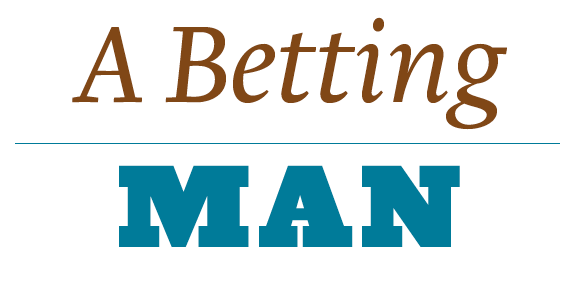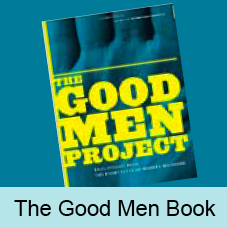
My column isn't about Hollywood images of manhood. I will certainly write about and interview plenty of guys who are heroic by anyone's definition--from marines to athletes to guys working in the trenches of poverty and abuse. But to me, manhood and goodness are not about getting it right from the get-go. They are about making mistakes--big mistakes--and then figuring out what the hell you're going to do about it.
As my grandmother told me when I called her shortly after being tossed out of the house fourteen years ago for being a drunk and a liar, "Tom, it's not how you fall in life that counts; it's how you pick yourself up."
So when I say everyone has a story, I mean everyone. I am particularly interested in guys who made huge mistakes in their lives. Are they now following my grandmother's advice? To me, manhood is about redemption. It's about admitting you screwed up. I'm always willing to listen to guys who others might criticize me for talking to, even just to learn what not to do.
When I spoke to convicted murderers at Sing Sing, I asked them what moment made them a man. I was moved to tears by their courage in sharing their stories with me. Given the mistakes I've made in my life, I'm in no position to judge others. But I am in a position to be inspired. That's the point of what I'm doing--to be inspired and to inspire you as a reader. So, fasten your seatbelts. It's going to be a bumpy ride.
With my Boston Celtics in the NBA finals, I wanted to explore a manhood problem that no one seems to want to talk about. We'll get to sex, drugs, and Wall Street in future columns. But why doesn't anyone want to talk about gambling? We won't legalize the drugs that are destroying our inner cities and causing Mexico to be burned to the ground, yet when it comes to casinos and lotteries, the government just keeps expanding in hopes of covering budget shortfalls. We're all too willing to ignore the fact that we're generating tax income by encouraging addictive behavior, largely among those least economically able to "play."
Along with Pete Rose, former NBA referee Tim Donaghy is among the most famous compulsive gamblers caught participating in professional sports. Many of my friends urged me not to give him the time of day, but I wanted to talk to Tim about his life, gambling, the NBA finals, and how NBA referees can unfairly impact the outcome of a game.
Donaghy worked as an NBA referee from 1994 to 2007. During that time, he officiated 772 regular season games and 20 playoff games. He resigned from the league on July 9, 2007, amidst reports of an investigation by the FBI into allegations that he bet on games that he officiated during his last two seasons. On August 15, 2007, Donaghy pled guilty to two federal charges related to the investigation and was sentenced to fifteen months in federal prison. He published a memoir, Personal Foul, in which he claims that NBA referees often let their biases get in the way of doing their jobs.
MATLACK: I'm a big Celtics fan, so I'm somewhat biased. But I've sat on the floor at the Fleet, up close and personal, watching the refereeing, and it just seems like it's a real problem in the game right now.
DONAGHY: It's a huge problem, because with the blueprint of the book and exposing what goes on in these final series, and putting it out in the open, it's really putting the NBA and the referees in the spotlight. And the bottom line is that there are a lot of knowledgeable fans out there who are being turned off by what's going on. Not only have I received a lot of letters from fans, but also owners and players, saying that they're hoping that this thing truly becomes an athletic competition where everybody's treated the same.
MATLACK: Do you think there's any role for video? In other sports, there's the ability to go back and actually look at a play. I know it's hard to do in basketball, because it's moving so quickly, but I always thought if you had somebody in a booth somewhere, he could actually be making the closer calls based on video rather than being on the court, having to try and look through huge bodies. Does that make any sense to you, or no?
DONAGHY: It absolutely makes sense, because there's an accountability factor with that. It would certainly be embarrassing for an official to miss a call and have it overturned.
MATLACK: Which rule do you think is broken the most flagrantly right now? If they want to move a game, what do they use?
DONAGHY: The traveling violation is one. It's being ignored or not based on the player. Another is freedom of movement, where certain people are allowed to grab and hold, and dislodge people. But then again, if you do something like that to a LeBron James, or a Dwyane Wade, or a Dwight Howard,the whistle's blown right away. It's just way, way too subjective, and they need to narrow that down a lot more to get the fans' confidence back.
MATLACK: Who do you think the NBA wants to win the final?
DONAGHY: You know, I don't really believe that they have a stake in who they want to win the final, but I think that their goal is certainly to have it go up into that sixth and hopefully seventh game, to where globally there's a tremendous amount at stake.
MATLACK: So tell me a little bit about your story, and how you got in trouble.
DONAGHY: Well, certainly I got in trouble because I suffer from a gambling addiction, and I crossed the line I should have never been near. I was betting on the NBA, and eventually on NBA teams that I refereed. And the reason that it's all exposed is that a friend of mine was passing the information along to people associated with organized crime, and when I decided I wanted to stop betting, the people who were getting these picks, and making millions of dollars off the picks, certainly didn't want to stop, and they picked me up in Philadelphia and basically threatened to expose me to the NBA or have somebody visit my wife and kids in Florida. So I participated, giving them the picks, and this whole thing was heard over Gambino wiretap, and the operation was basically exposed. I became a cooperating witness for the government against people associated with organized crime, and also the culture that existed within the NBA.
MATLACK: So, at that point, once they were threatening you, you started actually making calls based on making sure that the bets that they were making were going to win?
DONAGHY: No, it was never making calls in the game. In fact, there were times when they made reference to why I made certain calls against the teams I told them to bet. The bottom line is, I was winning 70-80% of the time. At no time did I need to go out and fix a game or make calls on a game to make sure some of these bets won.
MATLACK: So you were winning this based on your knowledge of the teams?
DONAGHY: My knowledge of the teams, my knowledge of relationships that existed between the referees and players, referees and coaches, and referees and owners, whether it was a positive relationship or a negative relationship. And I used that information to create a line on the game myself, and then I compared the line in the newspaper, and if there was a difference of four or five points, I would tell them to bet the game.
MATLACK: And so where are you now in terms of gambling? Have you completely given it up?
DONAGHY: I have given it up completely. I still go to treatment to stay away from the triggers that got me excited, pushed me in the direction to want to gamble. And not only that, I'm personally working for a gambling treatment center out of New Jersey called First Step. So it's something else that helps me with my therapy, and sharing my story with people who suffer from gambling addictions.
MATLACK: It seems like gambling has become such a huge business in this country. What do you think about that? We have a big controversy here in Massachusetts. The state senate and house are fighting over how many new gambling parlors to construct. There was going to be a big biotech complex just south of the city, and wouldn't you know, it's no longer going to be a biotech complex, it's going to be a huge casino.
DONAGHY: Wow.
MATLACK: Because the state decided they could make more money on a casino than they could on the biotech complex.
DONAGHY: Yeah, I mean it's absolutely exploding. My thought is, it really started to explode when ESPN got a hold of this Texas Hold 'Em, and these college campuses started having tournaments, and all these people started thinking that they were going to be the next guy to win $15 million in the World Series of Poker. People think that they're going to make an enormous amount of money out of playing cards for a living. It's just something that has gotten way out of hand, and I'm hoping that by people understanding my story, and sharing my story, that they'll realize that it's a dead end, and that not only is gambling not good for you, it affects the other people who are special in your life, and that's your family.
MATLACK: So what happened to you in that regard? What did you lose by gambling?
DONAGHY: I lost my job, I lost my family, I lost my freedom, and I don't think there are three more important things than that. You talk about being divorced with four children, a job where you're making over $300,000 a year, and a situation where you're put in jail with people accused of attempted murder--or double homicide. So all those things were certainly very, very tough to get through.
MATLACK: And what's your relationship with your kids like now?
DONAGHY: I've got a positive relationship with my kids. I talk to them every day. I'm in the process of working out a custody agreement so that I get to spend some more quality time with them. And it's something that, over time, is just going to be worked out, and we're going to move forward in a very positive way. And not only do I think that I've learned a great deal from this, I think a lot of other people have, also.
MATLACK: Yeah. Just so you know, my background is that I was CFO of a very big public company at 29. I had two little kids, but I got thrown out of the house for being a drunk and a cheat. That was 14 years ago. Then I went off and started a venture capital firm, and eventually got remarried and all that good stuff. But part of why I'm doing this magazine is because I believe that men have lost their way for a variety of reasons.
DONAGHY: Yeah, I can tell you that, I've hung out with a bunch of different guys, whether it was referees, whether it was my buddies growing up, or whether it's my new buddy here in Florida, and we all do the same fucking thing.
MATLACK: Well, the reassuring thing is that once you get on the other side a little bit, and you start actually talking to other guys, and trying to help other guys, you realize there's only a very small handful of ways of fucking up, and everyone does exactly the same thing. It's not like you're alone, for Christ's sake. It doesn't make it any less painful, but at least you're not alone.
So, on another note, we have these questions we ask everybody, from athletes to scientists to writers. So let me just walk through them with you. And generally, the best answer is whatever comes to your mind first. If you don't want to answer a question, just tell me you don't want to answer it.
DONAGHY: Okay.
MATLACK: So the first one is, who taught you about manhood in your life?
DONAGHY: My father. My father told me that there's right ways to handle things and wrong ways to handle things, and honestly, he gave me the knowledge to do everything the right way. For whatever reason, I chose to make some poor choices and mistakes in my life, and I paid greatly for that.
MATLACK: How has romantic love shaped you as a man?
DONAGHY: Not sure. I don't know if I have an answer for that one.
MATLACK: (laughter) That's fine. What two words describe your dad?
DONAGHY: Strong and ethical.
MATLACK: How are you most unlike him?
DONAGHY: I'm most unlike him because I made some poor decisions that he would never have made.
MATLACK: From which mistake have you learned the most?
DONAGHY: Which one? There are a couple of them. I think obviously I should have been able to face up to the fact that I had a problem before it got to where it got to, and put me in a position to cost me and my family a lot.
MATLACK: What word would women in your life use to describe you, and do you believe it's accurate?
DONAGHY: At this point, or in the past?
MATLACK: At this point. You can answer it however you want, but generally it's the--
DONAGHY: Remorseful. I'm truly sorry for what I did.
MATLACK: Who's the best dad you know, and how does he earn that distinction?
DONAGHY: Certainly that would be my dad, because he has stood by me in this situation where it would have been easily understood if he chose not to.
MATLACK: Have you been more successful in your public or your private life?
DONAGHY: I would say more successful in my private life, because my daughters are a part of that, and I'm very proud of them.
MATLACK: When was the last time you cried?
DONAGHY: Probably the day I got out of jail.
MATLACK: That's a good time to cry. What advice would you give teenage boys trying to figure out what it means to be a good man?
DONAGHY: I would tell them to realize that the choices that they're going to make in life, not only are those choices going to affect themselves, but they're going to affect their family, who are the people that they really care for and love the most. So to be a man is to make the right choices, and support and care for the people who mean the most to you.
MATLACK: And the last one is, what's your most cherished guy ritual?
DONAGHY: I guess working out. I just enjoy working out, and I do it every day, and it's something that helps me to get through the day, and begin it in a healthy way, and that's what I usually start out doing.
MATLACK: Do you lift weights? What do you do?
DONAGHY: Yeah, I lift weights, and try and do something that is going to get me started, and I feel good about myself.
MATLACK: That's all the questions. So where's your book available?
DONAGHY: Right now it's just available on amazon. A lot of them are sold out in the bookstores, and they're in the process of getting the paperback edition in there. But the best way to get it is on amazon.
MATLACK: Okay. Well, that's all I have, Tim. It's been a pleasure talking to you. I personally am a big believer in the idea of redemption. I mean, mywhole life has been about trying to make up for the mistakes I made. And so I really admire your courage and what you're doing.
DONAGHY: Yeah, I got a long way to go, but I'm staying down here, and I'm going to keep fighting every day, so we'll see what happens.
MATLACK: All right, man, keep going.
DONAGHY: Thanks, pal.



